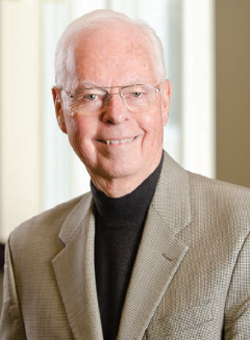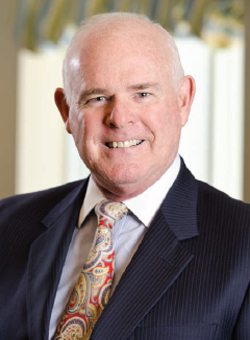As we reported in April, the Episcopal Retirement Homes (ERH) Board of Directors is made up of volunteer members who are dedicated to the organization’s mission to “enrich the lives of older adults in a person-centered, innovative and spiritually based way.”
Today’s entry is a continuation of our series, introducing you to the board volunteers dedicated to making retirement living a rewarding experience for Cincinnati seniors.
 The Rev. Darren Elin
The Rev. Darren Elin
As the rector at St. Thomas, the Rev. Darren Elin was a natural fit for the position of Episcopal Clergy Representative on the ERH Board. His experience in parish work and community relations helps him to advise the Board and ensure that the decisions they make on behalf of ERH’s retirement communities line up well with the organization’s ministerial goals.
“I believe in ERH’s mission to help those it serves live well into the future,” he said. “ERH has earned an excellent reputation for not only great service, but as a model employer and ministry partner.”
Elin, who is serving his first term with ERH, came to the ministry through his lifelong love of music. He began singing in church choirs while working overseas in Tokyo. In fact, that was where he met his wife. They have two children. One of their favorite family activities is attending concerts at Music Hall.
For Elin, the most rewarding part of serving as a volunteer board member is, “seeing just how much this ministry can make difference.”
 Dr. Robert Reed
Dr. Robert Reed
Dr. Robert Reed, who began serving on the ERH Board in 2013, has accumulated a vast body of experience treating seniors in at all stages of dementia as a neurologist practicing at Cincinnati’s Good Samaritan Hospital. And this experience has given him a particular insight and compassion for seniors who must live with the progressive disease.
The University of Cincinnati College of Medicine graduate and former Mayo fellow is currently the Director of Good Samaritan’s Electroencephalography (ECG) department and is an expert in Alzheimer’s care. He is particularly concerned with finding ways to slow the advance of the disease.
“I’m interested to see if a directed, intense learning program could flatten the curve of progression,” he said.
Working so long to help patients with neurological disorders allows him to bring a unique perspective to the Board’s work. He enjoys the sense of community he gets from his volunteerism.
“ERH has incorporated innovative methods of care based on respect for the integrity and needs of those in our aging population.” It is important, he stated, to address not only seniors’ healthcare needs, but their financial concerns as well.
“I believe in the mission to make care of the elderly affordable and healthy,” said Reed, which is why he advocates strongly that ERH continue to “reach out to those of limited resources to make care affordable.”
 Rich Setterberg
Rich Setterberg
Like Elin and Reed, Rich Setterberg is a relatively new board member, having served for less than a year. But as a healthcare law expert, his expertise in medical staff credentialing and healthcare organizational documents has already proved an invaluable asset.
“I first became actively involved in board governance issues involving the elderly and disabled when I served on the board of The Beechwood Home, which specializes in [caring for multiple sclerosis] patients,” he said. That experience strongly shaped his perspective on Cincinnati’s need for affordable, person-centered senior care.
“While I was serving at The Beechwood Home, I overcame my discomfort with the severely disabled.” Working to help disabled patients, Setterberg related, “helped me understand the human beings beneath the surface of disabilities.
“I have a great deal of empathy for the elderly. Those with less money, who are sick, or who are disabled are often forgotten,” he asserted. “I’d like to change not only that outcome, but also that attitude.”












